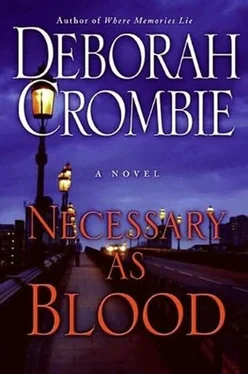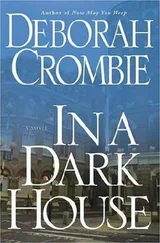So the house has a mission, and it believes that the natural state of human intelligence is not-like a painting-flat or square, but like this room it extends out and all around us. The house plots to work its magic to ensure that each visitor goes away with that perception. It may already have begun to happen to you.
– Dennis Severs, 18 Folgate Street: The Tale of a House in Spitalfields
Although the sun was far from setting, the neon signs burned over the curry palaces of Brick Lane. Many of the restaurants advertised air-conditioning, but the doors stood open, and the pervasive smell of Indian spices mingled with the dust and petrol fumes of the street.
Some of the less prosperous places had touts outside to lure tourists in with practiced patter, although Kincaid seriously doubted whether the restaurants ever gave the refunds so persuasively offered.
Ahmed Azad’s place, however, was easily picked out by its sleekly modern frontage. The closed front door hinted at real air-conditioning, and the interior Kincaid glimpsed through the window was minimalist, with brick walls, gleaming wooden tables, and sculpted leather chairs. There was the barest hint of an Indian theme in the deep orange-red patterned place mats and coordinating linens. The prices posted on the menu in the window were a little high, but not stratospheric, and there were quite a few diners, even at the early hour.
Sergeant Singh had told him that there would be queues later in the evening, even on a weeknight, and that the food wasn’t “half bad.” He guessed that coming from her that counted as a compliment. “Angla-Bangla, of course,” she’d added, “but they do it well, and they manage to sneak in a few more authentic dishes.”
Most of the diners, Kincaid saw, were in Western dress, but there were very few women. When he stepped inside, he was met by a blast of cool air, and then by a barrage of aromas that made his mouth water.
The waiters looked as sophisticated as the interior, all young men dressed in black shirts and trousers. Kincaid wondered if there had been anything about Azad’s great-nephew that made him stand out of the mix.
It was not one of the waiters who came forward to greet him, however, but Azad himself, wearing another expensive-looking suit cut for his rotund frame.
“Mr. Kincaid,” Azad said, shaking his hand. “To what do we owe the pleasure? Have you come to sample our cuisine?” Although his tone was friendly, his dark eyes were sharply alert.
“I’ve heard it’s very good, Mr. Azad, but I’ve just come for a chat, if you have a minute.” Kincaid’s stomach was telling him that it was a long time since he’d had lunch. But as tempted as he was by the aromas, he didn’t want to put himself at a disadvantage with Azad by becoming a customer.
“I take it this chat will not require my solicitor’s presence?” The question seemed to be rhetorical, as Azad smiled and motioned him forwards. “Come into my office. Perhaps you would like to try a chai tea?” Without waiting for Kincaid’s response, he signaled one of the waiters and barked an order in rapid Bengali.
He led Kincaid through the restaurant and into a small room to one side of the partially open kitchen. The office was clean and utilitarian, but the walls were adorned with fine photographic prints of a lush, green landscape that Kincaid assumed must be Bangladesh.
By the time Kincaid had taken the chair Azad offered, one of the black-clad waiters appeared with a glass mug of a milky, fragrantly spicy tea.
“You serve alcohol?” Kincaid asked, having noticed wineglasses on some of the tables.
“I don’t drink it, Mr. Kincaid, but this is a business.” Azad shrugged his padded shoulders. “If you want to be successful, you must please the customers.”
“It seems you have quite the City clientele.” Kincaid sipped his tea and found, rather to his surprise, that it wasn’t as sweet as he’d expected, and that he liked it.
“They have money to spend, and a little more refined taste than the average tourists, who just want their chicken tikka masala. But why should this be of interest to you, Mr. Kincaid?”
“Because I was wondering what you could tell me about Lucas Ritchie and his club.”
Lou Phillips lived in what Gemma guessed was a newer terrace, near the bottom end of Columbia Road, but the buildings were unusually constructed. While the ground-floor flats had little open patios, each pair of first-floor flats seemed to open onto a shared balcony, served by its own staircase.
Gemma checked her address again-yes, Louise Phillips’s flat was one of the first-floor pair at the end of the building, the one with the jungle of plants and flowers filling the balcony.
The one with the German shepherd dogs. There was an iron gate at the top of the stairs, and the two big dogs sat just inside it, watching her with what seemed a friendly interest.
A young man came out of the left-hand flat. He had spiky, bleached-blond hair and stud earrings, and wore a black T-shirt emblazoned with the enigmatic slogan GOT SLIDE? Giving the dogs a casual pat as he went by, he clanged out the gate and clattered down the stairs. As he passed Gemma, he said, “’ullo, love,” and gave her a cheeky grin.
Had he come from Louise Phillips’s flat, wondered Gemma? But no, according to the number, Phillips’s flat was the right-hand one. At least the dogs seemed friendly enough.
But when Gemma started up the stairs, both dogs stood, and the larger one gave a sharp bark. Gemma stopped, unsure of what to do. The doors to both flats stood open, and she was about to call out when a man wearing shorts and a Hawaiian shirt came out of the left-hand flat. He had brown hair drawn back in a ponytail, impressively muscled legs, and a pleasant face, and he carried a large old-fashioned watering can.
“You here to see Lou?” he called down to her. “Don’t mind the dogs. They’re a good combination of doorbell and burglar deterrent, but they won’t hurt you.”
The dogs’ tails had started to wag at the sound of the man’s voice, and they looked pleased with themselves, as if they knew they were being talked about. Gemma kept climbing, still with a bit of trepidation, but as she neared the top the man called the dogs to him. “Jagger, Ginger. Sit,” he commanded. The dogs sat, but their tails were wagging furiously. Their black and reddish-tan coats were glossy, and the expressions on their alert, intelligent faces seemed almost human.
“Jagger and Ginger?” said Gemma, stopping at the gate.
“As in Mick Jagger and Ginger Baker. My partner manages rock bands. The names are his little homage to the greats-although I doubt any of his current crop are likely to fill their boots. Except maybe Andy there,” he added, nodding in the direction the young man had disappeared in. “I’m Michael, by the way.” He came forward and opened the gate.
Gemma stepped through, and the dogs seemed to consider the gate shutting behind her as their release signal. She stood still as they came charging towards her, then let them sniff her thoroughly with their long, damp noses. She was glad she was wearing trousers and not a skirt.
“Here, I’ll call them off-,” began Michael, but Gemma stopped him.
“No. They’re lovely. They’re just getting acquainted with my dogs.”
“Ah, no wonder they like you. I take it you’re not here for Tam?” When Gemma shook her head, he glanced into the open door of the right-hand flat, calling out, “Lou, you’ve got a visitor.”
“I’m coming, I’m coming,” said the same slightly irritable female voice Gemma had heard over the phone.
A moment later, a woman appeared in the doorway. “Sorry, sorry,” she said. “Had to get out of the business suit and the bloody tights before I died. It should be against the law to wear things like that in this weather. You’re Gemma?”
Читать дальше












